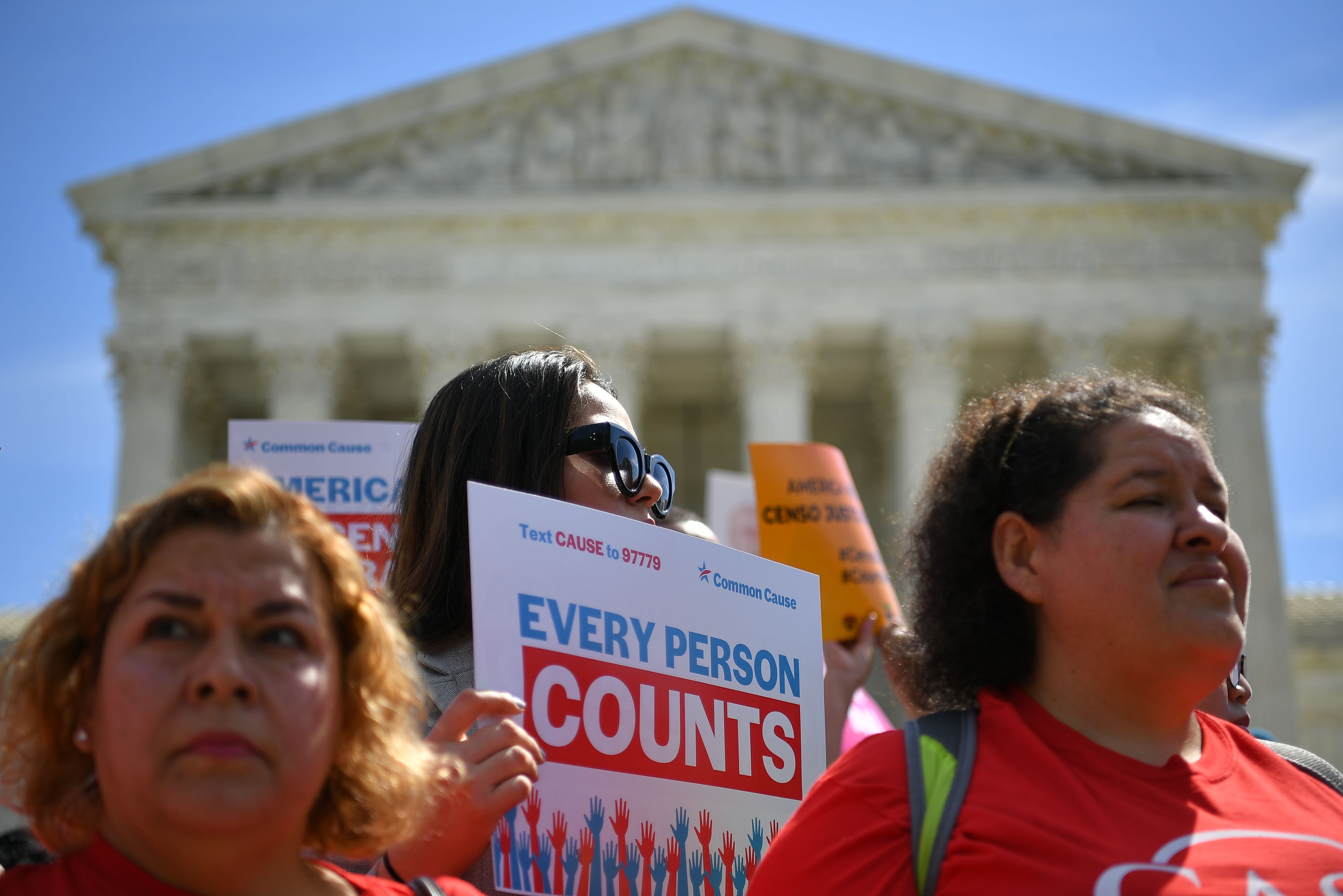- A federal appeals court authorized a trial judge in Maryland to review new evidence about the citizenship question on the 2020 census form Tuesday afternoon.
- The order came just hours before the Supreme Court hands down its decision on the census citizenship question. A ruling is due this week.
- In a striking development, the Trump administration asked the justices to decide on that new evidence on an expedited basis late Tuesday.
The Trump administration filed an extraordinary last-minute request at the Supreme Court in the census citizenship question case Tuesday, asking the justices to resolve a late-breaking controversy hours before their decision.
Solicitor General Noel Francisco sent a letter to the Supreme Court Tuesday asking the justices to address new evidence and an equal protection argument in its forthcoming ruling, even though those matters have not been explored in legal briefs or oral argument.
“The solicitor general has put the Court in a tough position,” South Texas College of Law Professor Josh Blackman told the Daily Caller News Foundation. “He asked the justices to rule on a difficult constitutional question, in a compressed time frame, without briefing and oral argument.”
The 4th U.S. Circuit Court of Appeals provoked the government’s petition after a Tuesday afternoon ruling, in which it authorized a federal judge in Maryland to explore new evidence that the administration added the citizenship question for partisan and discriminatory reasons. Though that matter is not currently before the Supreme Court, government lawyers asked the justices to rule on it in short order.
The plaintiffs in the census case purported to uncover new evidence in May that shows the government added the citizenship question to advance political goals. The Department of Justice counters that they need citizenship information to improve enforcement of the Voting Rights Act (VRA).
By the plaintiff’s telling, senior members of the administration conspired with Dr. Thomas Hofeller, a Republican redistricting guru, to collect granular citizenship data that would give the GOP a boost in redistricting. They also believe government officials actively concealed those facts throughout the case.
The Trump administration vigorously denied those charges in its own counter-filings, calling the unproven allegations “a conspiracy theory…that essentially hinges on wordplay.”
Federal judges in California, Maryland and New York have barred the government from appending the citizenship question. The plaintiffs say it will deter immigrant participation in the census, citing studies finding 6 million individuals could be excluded from a count that features a citizenship field. Those conclusions are especially troubling to left-leaning cities and states, since federal funds and seats in Congress are apportioned on the basis of population.
The Hofeller charges appeared over one month after the high court heard oral arguments in the census case. That uneasy state of affairs broke into something like chaos Tuesday afternoon, when the 4th Circuit said a trial court in Maryland should explore the Hofeller evidence allegedly showing the VRA rationale is a mere pretext for the government’s partisan plot.
The Maryland judge, U.S. District Judge George Hazel, has already expressed alarm about the new allegations. Former President Barack Obama appointed Hazel to the bench in 2014. (RELATED: Trump Official Deny Census Conspiracy In Closed Door Congressional Testimony)
“It is becoming difficult to avoid seeing that which is increasingly clear,” Hazel wrote of the Hofeller evidence in a Monday order. “As more puzzle pieces are placed on the mat, a disturbing picture of the decision-makers’s motives takes shape.”

Demonstrators rally at the Supreme Court to protest a proposal to add a citizenship question in the 2020 Census on April 23, 2019. (Mandel Ngan/AFP/Getty Images)
The 4th Circuit’s order created the strong possibility that Hazel will again bar the Trump administration from adding the citizenship question to the census form, on grounds entirely different from those now before the Supreme Court. The dispute currently before the justices relates to possible violates of agency law and the Constitution’s enumeration clause, while the Maryland case is based on equal protection principles and the Hofeller theory.
Time is another aggravating factor. The government says the census forms must be finalized in June to ensure timely printing and distribution, though some census officials believe the actual deadline is sometime this autumn.
“Were the district court to enter such an injunction, the government would be forced to seek emergency relief from this Court with a need for resolution by June 30, just five days from now,” Francisco wrote.
“To avoid that needless prospect…this Court should address the equal-protection claim in its opinion, and make clear that the administrative record, the extra-record evidence, and the Hofeller files do not, individually or together, provide any basis for setting aside the [government’s] decision,” Francisco added.
UC Irvine School of Law Professor Rick Hasen called the administration’s request outrageous, and predicted the Court’s decision could be a “travesty” on the order of Bush v. Gore.
“The issue has not been fully briefed,” Hasen wrote. “It was not the subject of oral argument. It involves evidence for which there has been no fact-finding. For the Supreme Court to decide the issue on this basis is the definition of lawlessness. It is not how the Supreme Court normally does business, and the solicitor general should know better.”
All content created by the Daily Caller News Foundation, an independent and nonpartisan newswire service, is available without charge to any legitimate news publisher that can provide a large audience. All republished articles must include our logo, our reporter’s byline and their DCNF affiliation. For any questions about our guidelines or partnering with us, please contact licensing@dailycallernewsfoundation.org.


